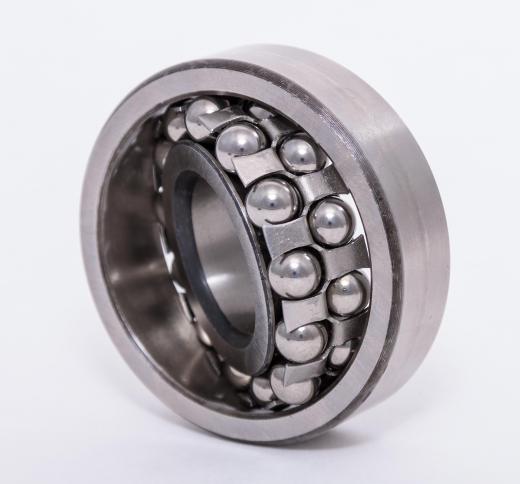The average steel ball bearing consists of a series of tiny metal balls set between two metal rings or cylinders. The steel ball bearing serves as a connector between two metal objects. These bearings are lubricated so they roll smoothly between the inner and outer metal rings, and also between the objects they are connecting. The freely-rolling balls help to reduce friction between the metal objects, which can improve performance in many applications. By minimizing friction, a steel ball bearing also reduces wear between two pieces of metal, which can reduce maintenance requirements and extend the like of the objects.
To understand how a steel ball bearing is used, it's helpful to picture the wheels on a skateboard. An inner metal ring in each wheel wraps around the axles, while an outer metal ring supports the outer surface of the wheels. A series of bearings fit between the two rings on each wheel. As the wheels turn, the ball bearings re-distribute the skateboard's load over a larger portion of the axle, which reduces friction. Less friction means that the wheels can spin faster, so riders can enjoy a faster, smoother ride.

These bearings are also used in many other types of leisure and hobby equipment. They can be found in most roller skate wheels, and are also used in fishing reels, where they help anglers reel in a fish more rapidly. Competitive yo-yo users also rely on ball bearings to improve the speed and performance of a yo-yo, and to allow users to perform more difficult tricks. Bearings are also used in most motors and engines, and can be found in many major appliances.

A steel ball bearing can also be found in the majority of door hinges. There may be a single bearing in the center of each hinge, or a pair of bearings located near the top and bottom of the hinge pin. These bearings sit between the knuckles of the hinge, which is where the two sides of the unit interlock. Ball bearing hinges reduce friction between the parts of the hinge, making it easier to open and close the door. These bearings can eliminate squeaky hardware and also extend the life of the door and frame.

Ball bearings must be maintained in order to maximize their useful life. The bearing should be lubricated regularly to further reduce friction, and must be kept as clean and dry as possible. It's also important to size bearings based on the size and weight of the load they will carry, as bearings that are too small will need replacement fairly quickly.
